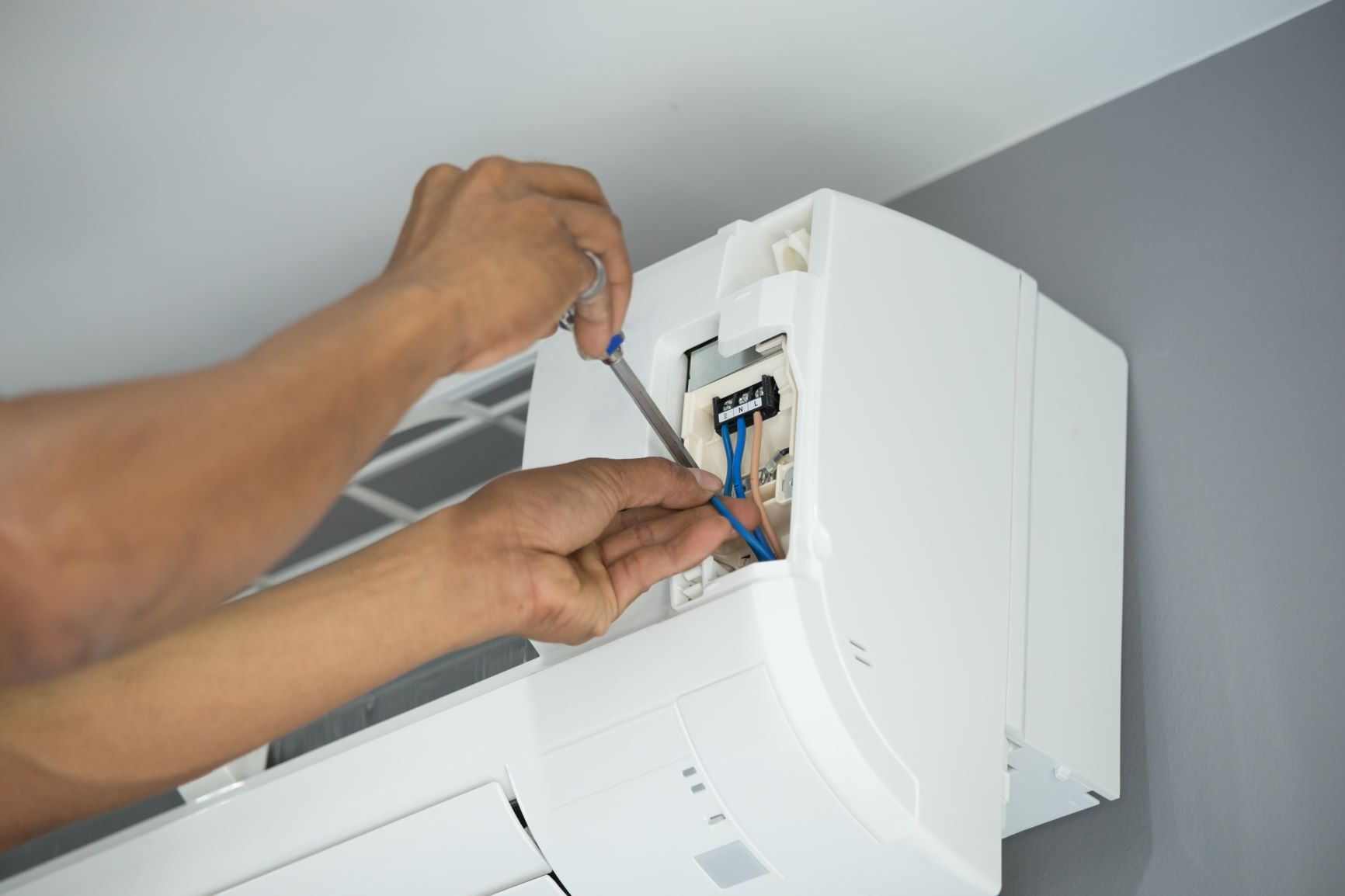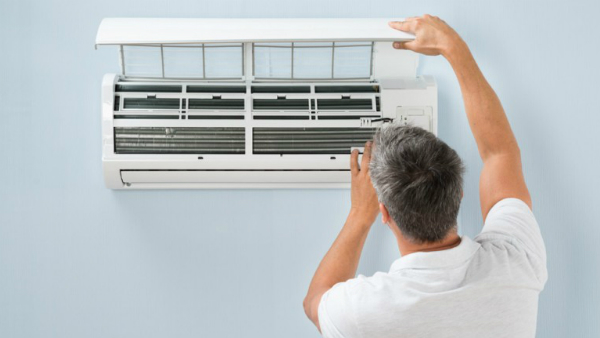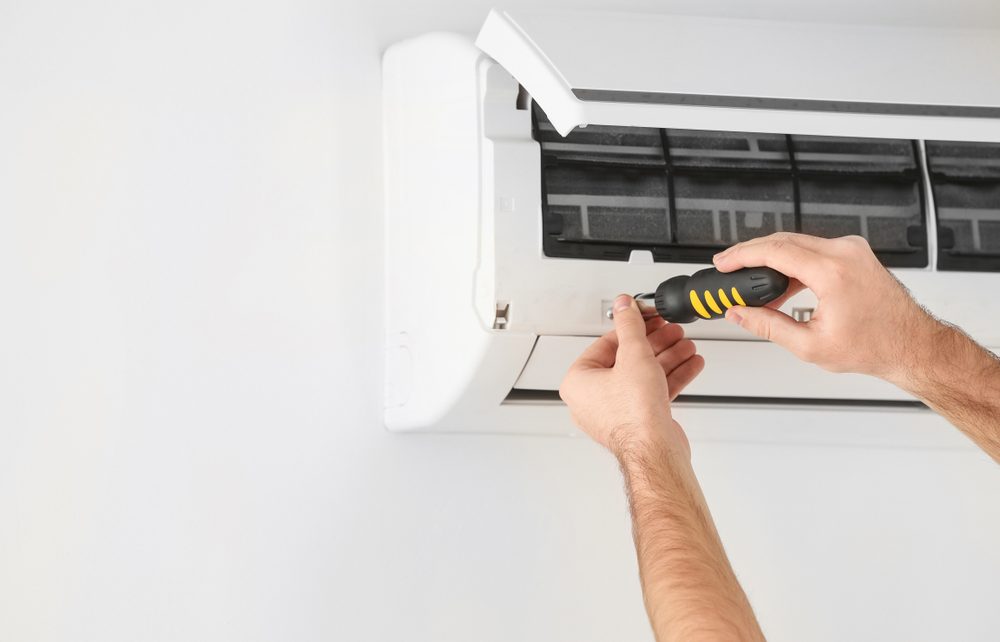Last Updated on July 26, 2021 by Rupesh Patil
Air conditioners are becoming an essential part of our lives, especially in regions that face extreme temperatures in summers or winters. When an AC breaks down, we face discomfort and a possible cost attached to getting it repaired. When an AC starts to fail, there are a few obvious signs. If you want your AC to be reliable and not break down all of a sudden, it is recommended that you should catch some early signs of a possible breakdown and get those problems fixed. In this article, we are listing the ten most common AC problems and their possible solutions.
Here Are The Most Common AC Related Problems
The most common AC-related problems include insufficient cooling, water leakage, banging and hissing noises, faulty remote control, and unusually high electricity bills.
1. AC Remote Is Not Working
If your AC remote controller is not working, you should start diagnosing the problem by checking the battery inside the remote controller. There’s a good chance that the battery charge is depleted. If that is not the case, check if the IR sensor is somehow covered. If it still doesn’t work, you might have to call for professional help.
2. AC Is Not Cooling Properly
Insufficient cooling is the most common AC problem that people face. If your AC isn’t cooling properly, it could be due to a number of reasons. It could either be due to clogged air filters, low refrigerant, a faulty motor, dirty outdoor unit, or even incorrect mode selection. You can read about the five most common reasons why your AC is not cooling here.
- Wrong AC Mode: You should first start by checking if you have selected the wrong AC mode using the remote controller. If you have, you should switch the AC back to cooling mode and set the correct temperature, and everything should be alright.
- Clogged Air Filters: An AC’s air filters can get clogged with dirt and dust after a few months of use, making the AC inefficient at cooling. You can easily clean the filters by removing them, washing them using warm running water a few times, and then reinstalling the filters.
- Dirty Outdoor Unit: The outdoor unit takes the hot air from inside the room via the indoor unit and then condenses it into cool air. The cool air is then transferred back to the indoor unit. However, when the outdoor unit is dirty, it can’t function efficiently. You can clean the outdoor unit using a wet cloth after turning off the power supply and remove the power cable from the socket.
- Low Refrigerant Level: Refrigerant is a chemical that absorbs heat from indoor air, making it a vital part of an AC. When there is an absence or insufficiency of the refrigerant, it could lead to insufficient cooling. If you can sense bubbling or hissing noise, or build-up of ice on the outdoor unit, it could be due to low refrigerant level. You should call for professional help to fix this problem as it isn’t something you can fix by yourself.
- Faulty Motor: If the AC’s fan motor gets broken or faulty, the AC can’t function properly and offer sufficient cooling. If you see the fan not spinning, then you should call the brand or some trusted professional to fix the problem.
3. Water Leaking Inside The Room
This is among the most common AC problems that people face. When the water leaks inside the room, it could be due to a few reasons. Either it is due to a clogged condensate drainage pipe (due to dirt, dust, algae, or fungi), damaged or rusted drain pan, or a broken condensate pump.
If the drain pipe is blocked or clogged, you can clean it by following these steps:
- Shut down the AC and remove the power cable from the electrical socket.
- Open the indoor unit’s front panel by following the instructions mentioned in your AC’s manual.
- Remove the air filters.
- Open the screws on the front panel.
- Pull off the large front cover.
- Open the plastic covers at the bottom of the AC’s indoor unit.
- Find the drain pipe and remove any tape that is used to connect the drain pipe to the main unit.
- Disconnect the drain pipe from the main unit and slowly drain water inside the pipe into a bucket.
- Use a vacuum cleaner to drain all the remaining water from the pipe and the AC unit’s drain outlet.
- Reattach the drain pipe to the AC unit’s drain outlet using tape.
- Now, reinstall the main panel using the screws that you had removed earlier.
- Now fit the air filters.
- And then install the front cover of the AC’s indoor unit.
We would still advise you to call a trusted AC service professional or a service engineer to clean the clogged drain pipe if you don’t have any experience with AC service.
If your AC is too old, the drain pan may have been rusted or damaged. In that case, you would need to replace it. If the condensate pump is broken, you need to get the pump repaired by a professional.
4. Water Leaking Outside The Room
It is normal for an AC to release a bit of water outside the room during its normal operation. Usually, that water dries up during a hot day. However, if you find an alarming amount of water outside your home from your AC, it could be because you have set an extremely low temperature. The problem may also occur if the AC is installed improperly.
It is advised by the Ministry of Power to set the AC temperature to 24°C. If the problem is arising due to your AC’s bad installation, you may need to call your AC’s brand service centre or seek help from a professional AC installer.
5. Unusually High Electricity Bills
Are you noticing unusually high electricity bills? It is among the most common AC problem that people face. Your AC can consume higher than usual power, resulting in high electricity bills, for various reasons. It could be due to improper insulation if you are leaving doors or windows open. You need to keep your room’s doors and windows completely closed and make sure that they are well insulated. You can read how you can save energy while using an AC here.
The problem might also arise if you are setting extremely low temperatures (such as 16°C or 18°C). As we mentioned earlier, India’s Ministry of Power recommends setting a temperature of 24°C while using an AC because it is a fine balance between cooling, experiencing a comfortable temperature, and power consumption.
Your AC might also consume unusually high power if you don’t maintain it properly. Make sure that you get your AC serviced every six months. It is recommended to clean the air filters, remove blockages from the drain pipe, and check for refrigerant leakages.
6. AC Is Making A Banging, Buzzing, Clicking, or Humming Sound
If your AC is making a low humming sound, everything is probably normal. However, if it is making loud banging, buzzing, clicking, or humming sounds constantly, there might be an issue with your AC.
If your AC’s outdoor unit is making a banging sound, it is possible that fan blades or other parts have become loose or are not functioning properly. A loud buzzing sound could point towards clogged air filters, debris stuck in your AC’s indoor or outdoor unit or some loose parts.
If you notice clicking sounds while turning your AC on or off, it’s normal. However, if you continue to hear clicking sounds, there could be a problem with the AC’s internal electrical components. In that case, you need to seek urgent professional help from the brand or trusted third-party service brands or engineers.
If you notice a high-pitched whistling or screaming sound from your AC, you should immediately turn off your AC and get help from an AC professional as the problem could be related to the refrigerant leak.
7. AC Is Vibrating Vigorously
If your split AC’s outdoor unit or your window AC is vibrating dangerously and making rattling noises, there could be a potential issue with the AC’s installation. Make sure that the window AC or your split AC’s outdoor unit is placed firmly on its installation platform and is levelled properly. You should follow your AC’s installation manual or call a trusted service engineer to solve the issue.
8. Ice Formation On The Evaporator Coils
Sometimes, ice can form on the AC’s evaporator coils, and your AC could stop functioning when that happens. When a thin sheet of ice forms on the coil, it can’t absorb latent heat, affecting the whole AC’s cooling performance. This problem occurs when you don’t maintain your AC regularly, leading to the collection of dirt, dust, and fungi on the air filter and other parts of the AC. It also occurs when the refrigerant level drops due to leakage.
If ice forms on your AC’s evaporator coils, make sure that you clean the air filters at a regular interval and there is no leakage of refrigerant. The problem should go away for most people.
9. AC Keeps Turning On & Off Repeatedly
If your AC keeps turning on and off repeatedly, there could be an electrical problem that you need to get checked. There might also be a problem related to a faulty temperature sensor or the compressor failing. These are some serious issues and not something that you can fix by yourself, so it would be best to call up your service engineer to solve the problem.
10. Bad Odour From Your AC
If you are sensing a bad and damp odour from your AC, it could be due to dirty air filters or coil. You should clean the filters by following the guidance mentioned in Step 2. To clean the coil, though, you would need specialised tools or call for professionals who could do it for you. It could also be due to the formation of algae or fungi.
There’s another odour that can be released from the AC. It’s the odour of the refrigerant, and it smells like ether, chloroform, or sweetness. If you sense such an odour, you should get your AC fixed by a professional.
These are the ten most common AC problems that people face, and maybe you’ve faced some of them, too. Some of these problems are easy to solve, but other problems need a qualified and well-trained engineer. You should also check out our AC buying guide so that you can easily understand which AC to buy for your needs.
If you use the AC regularly and more frequently, extra care is needed to keep it well-maintained and in a good condition. Many people face a broken down AC right in the middle of a hot summer, and if you don’t want to end up in the same situation, you should get your AC serviced regularly. Maybe even get an annual maintenance contract (AMC).





Discussion about this post